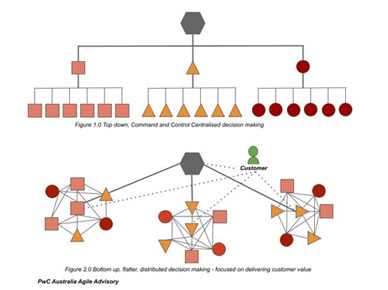THANK YOU FOR SUBSCRIBING

Why 21st Century Leaders need Empathy and Integrity to lead successfully
Julie Lee, PwC Agile Advisory Director


Julie Lee, PwC Agile Advisory Director
“Authoritarian, ego-driven command-and-control leadership no longer works. The 21st century needs leaders who act based on ethics, altruism, empathy, sustainability and collaboration.” The Egoless Leader
Fifty years ago, Peter Drucker famously coined the term ‘knowledge worker’ in his 1969 book, ‘The Age of Discontinuity’. Drucker’s definition of a knowledge worker, predominantly one with formal tertiary training, is their ability to apply theoretical and analytical knowledge to solve a problem, or more simply stated, one whose value is determined by applying their mind, rather than their muscles through physical labour. In more recent times, the definition and expectation of a knowledge worker has expanded where applying one’s mind alone isn’t enough, but rather how adaptable is the employee when faced with uncertainty and constant change. Employers are looking for passionate and innovative employees with a growth mindset and hunger for continuous learning. And in return, employees, especially millennials, are more aware and actively seeking employment with organisations that are purpose-led, contributing towards a positive social impact in society and have leaders that are self-aware and empathetic. In 2016, millennials made up the largest segment of US workers, and by 2030, they are expected to make up more than 75% of the workforce. With the current adoption of agile ways of working and the change in generational employment expectations, leaders are tackling not just the technological changes required to transform their business, but also the cultural shift required to remain sustainable, relevant and successful.Why empathy is important
Agile ways of working and design thinking share many common values. At their core, both frameworks centre on delivering speed to value for the customer. It’s about having empathy for the customer’s needs and goals, and grasping the context of how the product or service will be used. It’s seeking and understanding why the solution is important and valuable to the customer. Leaders adopting agile have often failed when they’ve only focused on the agile practices, or ‘doing’ agile: standups, sprints, sprint reviews and retrospectives. The cultural and mindset shift in ‘being’ agile is often overlooked and undervalued. It’s the intangible non-visible mindset and cultural shifts that are crucial for adopting and scaling agile ways of working successfully.“We need leaders who are emotionally intelligent, and able to model and champion co-operative working. They’ll coach, rather than command; they’ll be driven by empathy, not ego. The digital revolution needs a different, more human kind of leadership” Professor Klaus Schwab,
With the new structure, the ego-driven leader or a leader who expects to have all the answers is quickly replaced with decisions made by the team. To succeed, leaders must have a high level of self-awareness, humility and courage to let go and to call out when they don’t have the answers. Leaders need empathy to understand the employee experience and support their teams undergoing this change. For some employees, a shift from being told what to do, to being empowered to ‘decide’ what’s best for the customer can be overwhelming at best or fear-inducing at worst. For others, having autonomy and being trusted to do what’s right for the customer in a collaborative cross-functional team is an exciting opportunity for continued growth and learning.
Integrity is a non-negotiable
Organisations and employees are increasingly expecting their leaders to have a clear vision for the company with strong values they can support, and feel part of making a positive impact. Millennials are 22 times more likely to stay with a company that has purpose and meaning, compared to Gen Xers at 16 times and Baby Boomers at 13 times. In a recent article, ‘The Trials and Trust in Business’, our CEO at PwC Australia, Luke Sayers observed,“...The message is clear that our employees and broader society want business to be grounded in values they can understand, and take a stronger lead on the issues that matter.” Employees will naturally gravitate towards leaders who treat them with respect, compassion and autonomy. Employees are also more willing to offer discretionary time and work towards achieving a common goal when they feel supported and are clear on what the leader’s vision is and why it’s important. A true leader is one who’s able to garner influence regardless of title or position. Their inclusive, open and collaborative style over authoritative leadership ensures and instils an environment where employees can be creative and innovate to solve problems, rather than meeting or adhering to a process for fear of being reprimanded for non-compliance. Leaders who demonstrate a strong sense of integrity in what they do and how they treat their employees set the benchmark and culture on what’s acceptable behaviour. Strategy&’s 2018 CEO Success study found that while the overall rate of forced CEO turnovers was in line with recent trends, at 20%, the reasons CEOs were fired in 2018 were different. For the first time in the study’s history, more CEOs were dismissed for ethical lapses than for financial performance or board struggles. When Warren Buffet was asked what he looked for when hiring, his response was, “... you look for three qualities: integrity, intelligence, and energy. And if you don't have the first, the other two will kill you...”. A leader lacking in integrity, or one who’s easily compromised in difficult times, can be a potential liability for their organisation, and not a good role model for future leaders. With the generational wave of new employees seeking leaders and employers who offer not just a pay cheque, but also personal fulfilment, experiential work and purpose-led opportunities, leaders must listen, show empathy, actively lead with their values and vision, and be genuine and honest in walking the talk if they want to succeed in the long term.Weekly Brief
I agree We use cookies on this website to enhance your user experience. By clicking any link on this page you are giving your consent for us to set cookies. More info
Read Also













